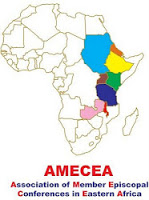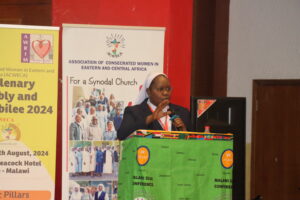AMECEA: “A Year of opportunities in the Region –A call for Reflection”

This
year has seen a blurry of activities globally and also in the AMECEA region, of
which AMECEA Justice Peace and Caritas office has been involved with the aim of
bringing forth the voice of the Bishops within the region. The most significant activity has not taken
place yet, but it is worth mentioning, “The Papal visit to Kenya and Uganda”.
year has seen a blurry of activities globally and also in the AMECEA region, of
which AMECEA Justice Peace and Caritas office has been involved with the aim of
bringing forth the voice of the Bishops within the region. The most significant activity has not taken
place yet, but it is worth mentioning, “The Papal visit to Kenya and Uganda”.
Yes,
the AMECEA region is humbled to host Pope Francis in two member countries and
we pray and hope that during this visit, a potential return visit to other AMECEA
countries may be announced. We leave this to God’s providence.
the AMECEA region is humbled to host Pope Francis in two member countries and
we pray and hope that during this visit, a potential return visit to other AMECEA
countries may be announced. We leave this to God’s providence.
Now,
I am coming back to the other activities that have taken place and in which
AMECEA Secretariat, through the Justice, Peace and Caritas Department, has been
deeply involved.
I am coming back to the other activities that have taken place and in which
AMECEA Secretariat, through the Justice, Peace and Caritas Department, has been
deeply involved.
First,
there was a meeting on Climate Change that took place in Rome from 5th
to 15th May, 2015 and was organized by the Pontifical Council for
Justice and Peace. This was just before Pope Francis release the timely Encyclical
on the Care of our Common Home, Laudato Si in July 2015. At this
meeting, the AMECEA Justice Peace and Caritas Department was privileged to
provide input on how best to popularize the Pope’s Encyclical. During this
meeting an input was provided on COP2, which refers to negotiations on climate
change that will take place in Paris and especially looking at what would be
the key take home.
there was a meeting on Climate Change that took place in Rome from 5th
to 15th May, 2015 and was organized by the Pontifical Council for
Justice and Peace. This was just before Pope Francis release the timely Encyclical
on the Care of our Common Home, Laudato Si in July 2015. At this
meeting, the AMECEA Justice Peace and Caritas Department was privileged to
provide input on how best to popularize the Pope’s Encyclical. During this
meeting an input was provided on COP2, which refers to negotiations on climate
change that will take place in Paris and especially looking at what would be
the key take home.
The
second major event of global importance was the Financing for Development
Conference that took place in Addis Ababa where AMECEA Justice Peace and
Caritas Department presented issues that are of great importance for the Church
in the AMECEA Region. The main issues are climate change, options for the poor
and peace building. Issues around ensuring that the developing countries are
heard especially on how to better undertake local resource mobilization and
good stewardship, were key thematic areas for discussion. This Conference also
gave foundation to the impact indicators for Sustainable Development Goals (SDGs)
that were passed later in September 2015 and also gave the Church perspective
before the address of the Holy Father to the United Nations.
second major event of global importance was the Financing for Development
Conference that took place in Addis Ababa where AMECEA Justice Peace and
Caritas Department presented issues that are of great importance for the Church
in the AMECEA Region. The main issues are climate change, options for the poor
and peace building. Issues around ensuring that the developing countries are
heard especially on how to better undertake local resource mobilization and
good stewardship, were key thematic areas for discussion. This Conference also
gave foundation to the impact indicators for Sustainable Development Goals (SDGs)
that were passed later in September 2015 and also gave the Church perspective
before the address of the Holy Father to the United Nations.
The
third engagement that AMECEA has been involved in at a global level is the World
Bank Group (WBG) and International Monetary Fund (IMF) Annual General Meeting
which took place in Lima, Peru, from 5th to 12th October
2015. This is what I would wish to discuss a little bit.
third engagement that AMECEA has been involved in at a global level is the World
Bank Group (WBG) and International Monetary Fund (IMF) Annual General Meeting
which took place in Lima, Peru, from 5th to 12th October
2015. This is what I would wish to discuss a little bit.
Unlike
the previous meeting in Addis Ababa and the New York meeting on Sustainable Development,
the WBG & IMF meeting is led by the Governors of Central Banks around the
world. These are the elusive technocrats that define how the citizens can
engage and are affected by the socio-economic environment of a country.
the previous meeting in Addis Ababa and the New York meeting on Sustainable Development,
the WBG & IMF meeting is led by the Governors of Central Banks around the
world. These are the elusive technocrats that define how the citizens can
engage and are affected by the socio-economic environment of a country.
They
are the persons charged with 1. Creating environments for job creation; 2.
Stabilizing economies ensuring growth; 3. Ensuring the social sectors in an
economy is well catered for to ensure the first two objectives are
attainable. It is therefore imperative that
we find the space in such meetings to raise the concerns of our people and
especially making sure that the AMECEA position is well articulated in the
regional conversations.
are the persons charged with 1. Creating environments for job creation; 2.
Stabilizing economies ensuring growth; 3. Ensuring the social sectors in an
economy is well catered for to ensure the first two objectives are
attainable. It is therefore imperative that
we find the space in such meetings to raise the concerns of our people and
especially making sure that the AMECEA position is well articulated in the
regional conversations.
What
were the critical take homes and what would we advice the AMECEA Conferences.
were the critical take homes and what would we advice the AMECEA Conferences.
1. Illicit financial flow is an issue that has to
be dealt with comprehensively and we as the Church have to keep our countries
engaged in the agenda of stemming this vice.
be dealt with comprehensively and we as the Church have to keep our countries
engaged in the agenda of stemming this vice.
2.
It is important for the Episcopal Conferences to
push for policies within the countries that create opportunities for job
creation especially for the youth. This
means projects such as the big infrastructure projects have to be up-scaled to
ensure that the youth have opportunities and to access markets.
It is important for the Episcopal Conferences to
push for policies within the countries that create opportunities for job
creation especially for the youth. This
means projects such as the big infrastructure projects have to be up-scaled to
ensure that the youth have opportunities and to access markets.
3. So as to ensure socio-economic engagement of our
youth and rural communities we have to ensure that we are growing in
technology. This includes farming
technologies, communication, health, education and virtually in every sector. This will bring about transformation of our
societies.
youth and rural communities we have to ensure that we are growing in
technology. This includes farming
technologies, communication, health, education and virtually in every sector. This will bring about transformation of our
societies.
4. We, as Church, have a critical role to play
especially in health, education and social protection. We have an obligation to invest in these
sectors that ensure the poor are not left behind.
especially in health, education and social protection. We have an obligation to invest in these
sectors that ensure the poor are not left behind.
5. Lastly and most importantly, we, as the Church, have
to ensure that there is good stewardship of the resources managed by the
governments on behalf of the people.
to ensure that there is good stewardship of the resources managed by the
governments on behalf of the people.
These
steps will help in creating a stronger engagement with the governments both
nationally and regionally.
steps will help in creating a stronger engagement with the governments both
nationally and regionally.
By Antony Mbandi, AMECEA Justice Peace and
Caritas Department Coordinator
Caritas Department Coordinator


